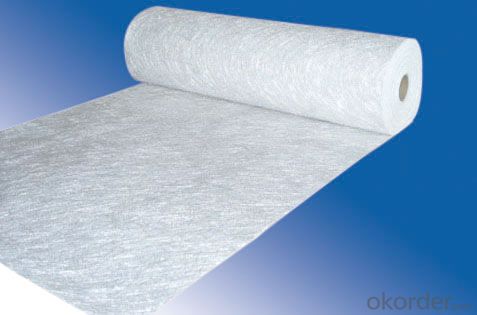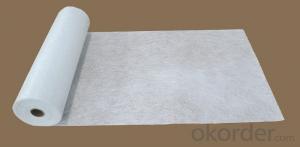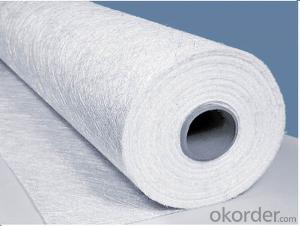E-glass Fiber Chopped Strand Mat(Powder Bonded)
- Loading Port:
- Shanghai
- Payment Terms:
- TT or LC
- Min Order Qty:
- 20000 kg
- Supply Capability:
- 200000 kg/month
OKorder Service Pledge
OKorder Financial Service
You Might Also Like
Brief Introduction
Chopped strand mat (or CSM as it is often known) is the most widely used of all composite reinforcement materials.
Short strands of glass are randomly scattered and bound to create a mat which can then be wetted out with resin and used as a general purpose reinforcement for traditional fibreglass (GRP/FRP) moulds or parts.
Product Features:
1. Fast Wet-out
2. Even thickness
3. High mechanical strength
4. Excellent wet strength retention

Product Specifications: Property Area Weight Moisture Content Size Content Breakage Strength Width (%) (%) (%) (N) (mm) Property IS03374 ISO3344 ISO1887 ISO3342 EMC80P ±7.5 ≤0.20 8-12 ≥40 50-3300 EMC100P ≥40 EMC120P ≥50 EMC150P 4-8 ≥50 EMC180P ≥60 EMC200P ≥60 EMC225P ≥60 EMC300P 3-4 ≥90 EMC450P ≥120 EMC600P ≥150 EMC900P ≥200
Special specification can be produce according to customer requirements.
Deliverytime
15-20days after received deposit.
Packaging
Plastic bag packing, 2 / 4 / 6 / 8 rolls in one carton box,then tray.
Other terms
We accept the CUSTOMIZATION. OEM is our strength.(spec, color, packing,etc)
- Q:Can fiberglass mat tissue be used for reinforcement in composites?
- Yes, fiberglass mat tissue can be used for reinforcement in composites. Fiberglass mat tissue is a non-woven material made up of randomly oriented glass fibers. It is commonly used as a reinforcement material in composite manufacturing processes. The mat tissue is often combined with resin to create a strong and durable composite material. The random orientation of the fibers provides multidirectional strength and reinforcement to the composite structure. Additionally, the mat tissue can be easily layered and molded into complex shapes, making it a versatile choice for various applications in industries such as automotive, aerospace, construction, and marine. Overall, fiberglass mat tissue is an effective and widely used reinforcement material in composites.
- Q:How long does fiberglass mat tissue last?
- The lifespan of fiberglass mat tissue varies depending on various factors such as the quality of the material, environmental conditions, and maintenance. However, on average, fiberglass mat tissue can last for several decades if properly installed and cared for.
- Q:Can fiberglass mat tissue be used for repairing fiberglass jet skis?
- Indeed, fiberglass mat tissue proves to be a valuable asset when it comes to restoring fiberglass jet skis. This material is frequently employed in fiberglass repairs due to its ability to fortify and reinforce afflicted regions. Its versatility allows for its use in a multitude of fiberglass repair scenarios, such as rectifying cracks or punctures found in jet skis. When skillfully applied, fiberglass mat tissue effectively reestablishes the jet ski's structural soundness, guaranteeing a resilient and enduring mending.
- Q:How is fiberglass mat tissue used in the production of chemical reactors?
- Fiberglass mat tissue is used in the production of chemical reactors as a reinforcement material. It is typically applied to the inner surface of the reactor to provide structural strength, enhance resistance to corrosion, and improve overall durability. The fiberglass mat tissue acts as a barrier against chemical reactions, preventing leaks or damage to the reactor. Additionally, it helps maintain a stable temperature inside the reactor, ensuring efficient and safe chemical processes.
- Q:Can fiberglass mat tissue be used for reinforcing pipes?
- Certainly, reinforcing pipes is indeed possible with the use of fiberglass mat tissue. Comprised of fine glass fibers that are randomly arranged, fiberglass mat tissue possesses remarkable strength and flexibility. Consequently, it becomes an optimal material for the reinforcement of various structures, such as pipes. As soon as it is applied to the pipe's surface, the fiberglass mat tissue significantly enhances its strength and durability, effectively averting the occurrence of cracks and leaks. Moreover, its resistance to corrosion renders fiberglass mat tissue suitable for implementation in pipes that transport corrosive substances. All in all, fiberglass mat tissue stands as a dependable choice for reinforcing pipes and ensuring their enduring performance.
- Q:Can fiberglass mat tissue be used for reinforcing fiberglass tanks?
- Yes, fiberglass mat tissue can be used for reinforcing fiberglass tanks. Fiberglass mat tissue is a thin, lightweight material that is commonly used in the construction of fiberglass products. It is designed to provide additional strength and durability to the fiberglass structure. In the case of fiberglass tanks, the mat tissue can be used as a reinforcement layer to enhance the overall structural integrity of the tank. It helps to prevent cracking, improve impact resistance, and increase the tank's ability to withstand external forces and pressure. Additionally, fiberglass mat tissue is easy to work with and can be easily molded or applied to the tank's surface, making it a suitable choice for tank reinforcement.
- Q:How does fiberglass mat tissue compare to other types of insulation materials?
- Fiberglass mat tissue is a type of insulation material that has its own unique characteristics and advantages when compared to other insulation materials. Firstly, fiberglass mat tissue is known for its excellent thermal insulation properties. It has a low thermal conductivity, meaning it effectively reduces the transfer of heat between the inside and outside of a building. This helps to keep buildings cooler in the summer and warmer in the winter, leading to energy savings and increased comfort. In addition to its thermal insulation capabilities, fiberglass mat tissue also offers excellent sound insulation. It helps to reduce noise transmission through walls and floors, creating a quieter and more peaceful indoor environment. This is particularly beneficial in commercial buildings, where noise reduction is important for productivity and customer satisfaction. Furthermore, fiberglass mat tissue is a lightweight and flexible material, making it easy to handle and install. It can be easily cut to fit around obstacles such as pipes and ducts, ensuring a tight and efficient insulation barrier. This ease of installation saves time and labor costs during construction or renovation projects. Another advantage of fiberglass mat tissue is its fire resistance. It is a non-combustible material, meaning it does not contribute to the spread of fire. This is especially crucial in buildings where fire safety is a top priority, such as hospitals, schools, and residential properties. Moreover, fiberglass mat tissue is durable and long-lasting. It does not degrade or lose its insulation properties over time, ensuring consistent energy efficiency and performance for many years. This durability makes it a cost-effective insulation choice, as it reduces the need for frequent replacement or maintenance. Lastly, fiberglass mat tissue is environmentally friendly. It is made from recycled glass and sand, which reduces the demand for raw materials. Additionally, it is recyclable at the end of its lifespan, further reducing waste and promoting sustainability. Overall, fiberglass mat tissue offers excellent thermal and sound insulation, ease of installation, fire resistance, durability, and environmental benefits. While other insulation materials may have their own advantages, fiberglass mat tissue is a versatile and reliable option for various applications.
- Q:How does the cost of fiberglass mat tissue compare to other reinforcement materials?
- The cost of fiberglass mat tissue generally tends to be more affordable compared to other reinforcement materials. Fiberglass mat tissue is widely used in various industries, such as construction and automotive, due to its cost-effectiveness. Other reinforcement materials like carbon fiber or aramid fibers can be significantly more expensive, making fiberglass mat tissue a preferred choice for many applications that require reinforcement. Additionally, fiberglass mat tissue offers excellent strength and durability, making it a cost-effective solution for projects that require reliable reinforcement without breaking the budget.
- Q:Can fiberglass mat tissue be used for making insulation boards?
- Fiberglass mat tissue is indeed a viable option for the production of insulation boards. This lightweight and flexible material is frequently employed in the creation of insulation boards. It boasts exceptional thermal insulation capabilities, as well as the ability to absorb sound and resist fire. The process of layering and compressing the mat tissue is typically employed to manufacture these insulation boards, resulting in a robust and efficient barrier against heat transfer. Furthermore, fiberglass mat tissue is impervious to moisture, mold, and pests, making it a trustworthy choice for insulation purposes. In summary, the insulation performance, durability, and resistance to environmental elements make fiberglass mat tissue a suitable choice for the construction of insulation boards.
- Q:What is the moisture absorption rate of fiberglass mat tissue?
- The moisture absorption rate of fiberglass mat tissue can vary depending on various factors such as the specific type of fiberglass mat tissue and its manufacturing process. However, in general, fiberglass mat tissue is known to have a relatively low moisture absorption rate. This is due to the hydrophobic nature of fiberglass, which means it repels water and is not easily permeated by moisture. As a result, fiberglass mat tissue is often used in applications where moisture resistance is important, such as in roofing materials, insulation, and automotive parts. While the exact moisture absorption rate may not be readily available without specific product information, fiberglass mat tissue is generally considered to be a moisture-resistant material.
1. Manufacturer Overview |
|
|---|---|
| Location | |
| Year Established | |
| Annual Output Value | |
| Main Markets | |
| Company Certifications | |
2. Manufacturer Certificates |
|
|---|---|
| a) Certification Name | |
| Range | |
| Reference | |
| Validity Period | |
3. Manufacturer Capability |
|
|---|---|
| a)Trade Capacity | |
| Nearest Port | |
| Export Percentage | |
| No.of Employees in Trade Department | |
| Language Spoken: | |
| b)Factory Information | |
| Factory Size: | |
| No. of Production Lines | |
| Contract Manufacturing | |
| Product Price Range | |
Send your message to us
E-glass Fiber Chopped Strand Mat(Powder Bonded)
- Loading Port:
- Shanghai
- Payment Terms:
- TT or LC
- Min Order Qty:
- 20000 kg
- Supply Capability:
- 200000 kg/month
OKorder Service Pledge
OKorder Financial Service
Similar products
New products
Hot products
Related keywords



























